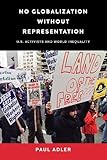No Globalization Without Representation : U.S. Activists and World Inequality / Paul Adler.
Material type: TextSeries: Power, Politics, and the WorldPublisher: Philadelphia : University of Pennsylvania Press, [2021]Copyright date: ©2021Description: 1 online resource (344 p.) : 10 illusContent type:
TextSeries: Power, Politics, and the WorldPublisher: Philadelphia : University of Pennsylvania Press, [2021]Copyright date: ©2021Description: 1 online resource (344 p.) : 10 illusContent type: - 9780812299663
- Anti-globalization movement -- United States -- History
- Environmentalism -- United States -- History -- 20th century
- Social movements -- Political aspects -- United States
- Social participation -- United States
- United States -- Politics and government -- 20th century
- HISTORY / United States / 20th Century
- American History
- American Studies
- 322.4 23
- HN57
- online - DeGruyter
| Item type | Current library | Call number | URL | Status | Notes | Barcode | |
|---|---|---|---|---|---|---|---|
 eBook
eBook
|
Biblioteca "Angelicum" Pont. Univ. S.Tommaso d'Aquino Nuvola online | online - DeGruyter (Browse shelf(Opens below)) | Online access | Not for loan (Accesso limitato) | Accesso per gli utenti autorizzati / Access for authorized users | (dgr)9780812299663 |
Frontmatter -- CONTENTS -- List of Abbreviations -- Introduction -- Prologue. The Good Parts of the System to Beat the Bad -- PART I. DON’T BUY NESTLÉ -- PART II. A NEW INTERNATIONAL REGULATORY ORDER -- PART III. REVOLUTION WITHIN THE WORLD CAPITALIST SYSTEM -- PART IV. WE FOUGHT BIG AGAINST NAFTA AND LOST -- PART V. REBUILDING TO VICTORY IN THE 1990S -- PART VI. YOU MUST COME TO SEATTLE -- Coda. A Multiheaded Swarm of a Movement -- Conclusion -- Notes -- Index -- Acknowledgments
restricted access online access with authorization star
http://purl.org/coar/access_right/c_16ec
Amid the mass protests of the 1960s, another, less heralded political force arose: public interest progressivism. Led by activists like Ralph Nader, organizations of lawyers and experts worked "inside the system." They confronted corporate power and helped win major consumer and environmental protections. By the late 1970s, some public interest groups moved beyond U.S. borders to challenge multinational corporations. This happened at the same time that neoliberalism, a politics of empowerment for big business, gained strength in the U.S. and around the world.No Globalization Without Representation is the story of how consumer and environmental activists became significant players in U.S. and world politics at the twentieth century's close. NGOs like Friends of the Earth and Public Citizen helped forge a progressive coalition that lobbied against the emerging neoliberal world order and in favor of what they called "fair globalization." From boycotting Nestlé in the 1970s to lobbying against NAFTA to the "Battle of Seattle" protests against the World Trade Organization in the 1990s, these groups have made a profound mark.This book tells their stories while showing how public interest groups helped ensure that a version of liberalism willing to challenge corporate power did not vanish from U.S. politics. Public interest groups believed that preserving liberalism at home meant confronting attempts to perpetuate conservative policies through global economic rules. No Globalization Without Representation also illuminates how professionalized organizations became such a critical part of liberal activism—and how that has affected the course of U.S. politics to the present day.
Mode of access: Internet via World Wide Web.
In English.
Description based on online resource; title from PDF title page (publisher's Web site, viewed 01. Dez 2022)


